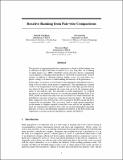Notice
This is not the latest version of this item. The latest version can be found at:https://dspace.mit.edu/handle/1721.1/137118.2
Iterative ranking from pair-wise comparisons
| dc.contributor.author | Shah, Devavrat | |
| dc.contributor.author | Negahban, Sahand | |
| dc.date.accessioned | 2021-11-02T17:13:03Z | |
| dc.date.available | 2021-11-02T17:13:03Z | |
| dc.date.issued | 2012 | |
| dc.identifier.uri | https://hdl.handle.net/1721.1/137118 | |
| dc.description.abstract | The question of aggregating pairwise comparisons to obtain a global ranking over a collection of objects has been of interest for a very long time: be it ranking of online gamers (e.g. MSR's TrueSkill system) and chess players, aggregating social opinions, or deciding which product to sell based on transactions. In most settings, in addition to obtaining ranking, finding 'scores' for each object (e.g. player's rating) is of interest to understanding the intensity of the preferences. In this paper, we propose a novel iterative rank aggregation algorithm for discovering scores for objects from pairwise comparisons. The algorithm has a natural random walk interpretation over the graph of objects with edges present between two objects if they are compared; the scores turn out to be the stationary probability of this random walk. The algorithm is model independent. To establish the efficacy of our method, however, we consider the popular Bradley-Terry-Luce (BTL) model in which each object has an associated score which determines the probabilistic outcomes of pairwise comparisons between objects. We bound the finite sample error rates between the scores assumed by the BTL model and those estimated by our algorithm. This, in essence, leads to order-optimal dependence on the number of samples required to learn the scores well by our algorithm. Indeed, the experimental evaluation shows that our (model independent) algorithm performs as well as the Maximum Likelihood Estimator of the BTL model and outperforms a recently proposed algorithm by Ammar and Shah [1]. | en_US |
| dc.language.iso | en | |
| dc.relation.isversionof | https://papers.nips.cc/paper/4701-iterative-ranking-from-pair-wise-comparisons | en_US |
| dc.rights | Article is made available in accordance with the publisher's policy and may be subject to US copyright law. Please refer to the publisher's site for terms of use. | en_US |
| dc.source | Neural Information Processing Systems (NIPS) | en_US |
| dc.title | Iterative ranking from pair-wise comparisons | en_US |
| dc.type | Article | en_US |
| dc.identifier.citation | Shah, Devavrat and Negahban, Sahand. 2012. "Iterative ranking from pair-wise comparisons." | |
| dc.eprint.version | Final published version | en_US |
| dc.type.uri | http://purl.org/eprint/type/ConferencePaper | en_US |
| eprint.status | http://purl.org/eprint/status/NonPeerReviewed | en_US |
| dc.date.updated | 2019-07-16T14:30:45Z | |
| dspace.date.submission | 2019-07-16T14:30:45Z | |
| mit.license | PUBLISHER_POLICY | |
| mit.metadata.status | Authority Work and Publication Information Needed | en_US |
